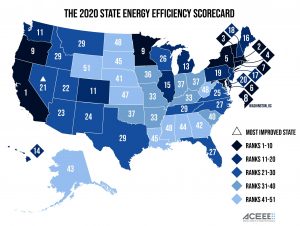
A new energy report shows more states have adopted or advanced new energy-saving targets and vehicle and appliance rules but Oklahoma made no progress from a year ago.
The 2020 State Energy Efficiency Scorecard released by the American Council for an Energy-Efficient Economy (ACEEE) ranked Oklahoma tied for 37th, the same position it held last year.
The state scored 11.5 points out of a possible 50, actually a half-point less than it earned in 2019. The scorecard said electric savings still remain lower in Oklahoma compared to the national average.

Under the heading of Utilities, the card said utilities run electricity and natural gas efficiency programs but savings lag behind the national average. It explained that large electric customers are allowed to opt out of efficiency programs and nearly 90% of the eligible customers have chosen to do so.
Under the Transportation heading, Oklahoma has seen a reduction in vehicle miles traveled per capital but that there is room for improvement.
The Building Energy Efficiency Policies heading said the state has “significant room for improvement” in strengthening efficiency in the building sector.
The State Government-Led Initiatives sector said the state government leads by example by requiring efficient buildings and benchmarking energy use but opportunities remain to set efficiency targets for state vehicle fleets.
The final sector, Appliance Standards said Oklahoma has not set appliance standards beyond those required by the federal government.
For the first time in four years, California took first place nationwide, edging out Massachusetts, the leader in the Northeast. Other regional leaders include Minnesota in the Midwest, Colorado in the Southwest, and Virginia in the South.
Rounding out this year’s top 10, are Massachusetts (#2), Vermont (#3), Rhode Island (#4), New York (#5), Maryland (#6), Connecticut (#7), Washington, DC (#8), and Minnesota and Oregon (tied for #9).
Nevada (#21) was the most improved state in the scorecard, moving up five places. It has adopted standards for light bulbs, strengthened building energy codes, and moved to implement strong vehicle standards.
In contrast, Iowa (#36) fell the farthest in the rankings, losing 13 places. Its slide occurred primarily as a result of 2018 legislation that capped certain efficiency investments, leading to a steep decline in progress in reducing electricity and gas use.
The bottom five states, each earning 7 or fewer points, are Kansas (#47), Mississippi (#48), North Dakota (#48), West Virginia (#48) and Wyoming (#51).

